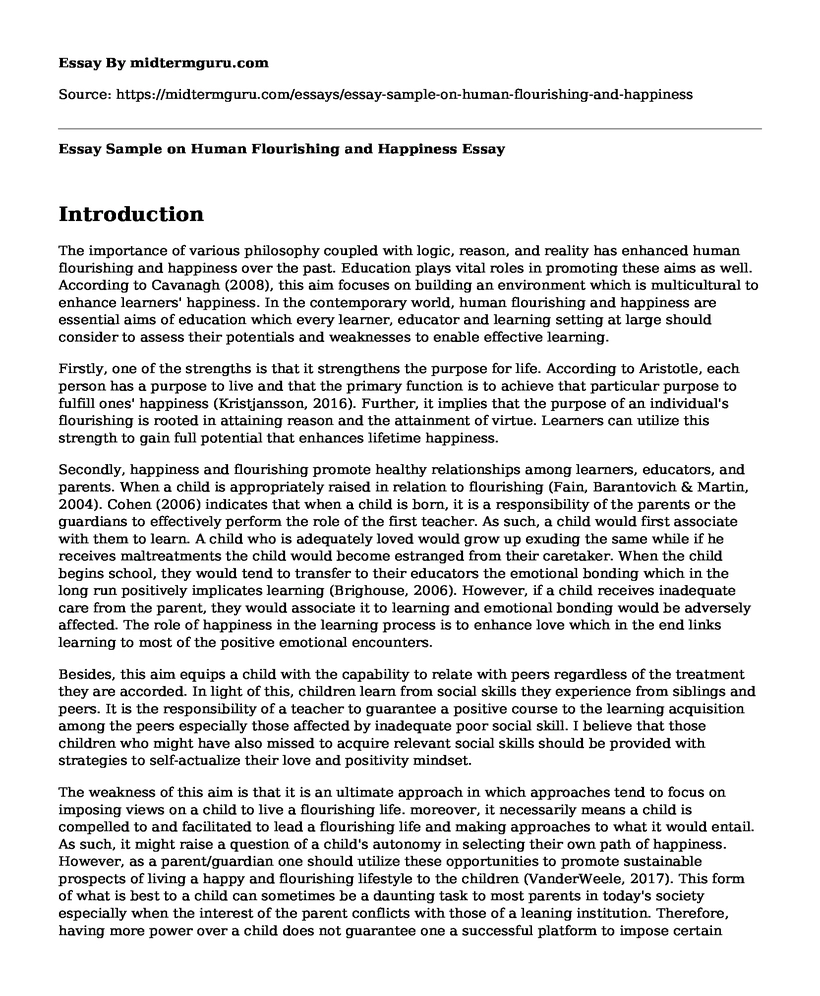Introduction
The importance of various philosophy coupled with logic, reason, and reality has enhanced human flourishing and happiness over the past. Education plays vital roles in promoting these aims as well. According to Cavanagh (2008), this aim focuses on building an environment which is multicultural to enhance learners' happiness. In the contemporary world, human flourishing and happiness are essential aims of education which every learner, educator and learning setting at large should consider to assess their potentials and weaknesses to enable effective learning.
Firstly, one of the strengths is that it strengthens the purpose for life. According to Aristotle, each person has a purpose to live and that the primary function is to achieve that particular purpose to fulfill ones' happiness (Kristjansson, 2016). Further, it implies that the purpose of an individual's flourishing is rooted in attaining reason and the attainment of virtue. Learners can utilize this strength to gain full potential that enhances lifetime happiness.
Secondly, happiness and flourishing promote healthy relationships among learners, educators, and parents. When a child is appropriately raised in relation to flourishing (Fain, Barantovich & Martin, 2004). Cohen (2006) indicates that when a child is born, it is a responsibility of the parents or the guardians to effectively perform the role of the first teacher. As such, a child would first associate with them to learn. A child who is adequately loved would grow up exuding the same while if he receives maltreatments the child would become estranged from their caretaker. When the child begins school, they would tend to transfer to their educators the emotional bonding which in the long run positively implicates learning (Brighouse, 2006). However, if a child receives inadequate care from the parent, they would associate it to learning and emotional bonding would be adversely affected. The role of happiness in the learning process is to enhance love which in the end links learning to most of the positive emotional encounters.
Besides, this aim equips a child with the capability to relate with peers regardless of the treatment they are accorded. In light of this, children learn from social skills they experience from siblings and peers. It is the responsibility of a teacher to guarantee a positive course to the learning acquisition among the peers especially those affected by inadequate poor social skill. I believe that those children who might have also missed to acquire relevant social skills should be provided with strategies to self-actualize their love and positivity mindset.
The weakness of this aim is that it is an ultimate approach in which approaches tend to focus on imposing views on a child to live a flourishing life. moreover, it necessarily means a child is compelled to and facilitated to lead a flourishing life and making approaches to what it would entail. As such, it might raise a question of a child's autonomy in selecting their own path of happiness. However, as a parent/guardian one should utilize these opportunities to promote sustainable prospects of living a happy and flourishing lifestyle to the children (VanderWeele, 2017). This form of what is best to a child can sometimes be a daunting task to most parents in today's society especially when the interest of the parent conflicts with those of a leaning institution. Therefore, having more power over a child does not guarantee one a successful platform to impose certain views on how they should flourish upon them.
References
Brighouse, H. (2006) On education. Retrieved from http://lib.myilibrary.com.proxy.lib.sfu.ca/Open.aspx?id=41417
Cavanagh, T. ((2008). Schooling for happiness: Rethinking the aims of education. Kairaranga 9(1), 20-23. Retrieved from http://www.eric.ed.gov/PDFS/EJ908171.pdf
Cohen, J.E. (2006). Goals of universal basic and secondary education. Prospects 36 (3), pp. 1-23. Retrieved from http://lab.rockefeller.edu/cohenje/PDFs/331CohenGoalsOfEducationProspectsUNESCO200609.pdf
Fain, S.M., Barantovich, M., and Martin, R. (2004). The aims of education in an age of stasis and change. UNESCO-EOLSS. Retrieved from: http://www.eolss.net/EolssSampleChapters/C04/E6-61-01-01/E6-61-01-01-TXT-02.aspx#The_Aims_of_Education_In_An_Age_of_Stasis_and_Change
Kristjansson, K. (2016). Flourishing as the aim of education: Towards an extended, 'enchanted' Aristotelian account. Oxford Review of Education, 42(6), 707-720. https://doi.org/10.1080/03054985.2016.1226791
VanderWeele, T. (2017). On the promotion of human flourishing. Proceedings of The National Academy of Sciences, 114(31), 8148-8156. doi: 10.1073/pnas.1702996114
Cite this page
Essay Sample on Human Flourishing and Happiness. (2022, Sep 06). Retrieved from https://midtermguru.com/essays/essay-sample-on-human-flourishing-and-happiness
If you are the original author of this essay and no longer wish to have it published on the midtermguru.com website, please click below to request its removal:
- My Greatest Crucible
- Essay on Educational Technology and Future Trends
- Essay on Bilingual Language Learning Development in Infants
- Statement of Interest for Business MBA Program Master of Accounting
- Essay Sample on Knight in Shining Armor
- Does Language Shape the Mind? - Paper Example
- Time Management Strategies for Teachers in South Arabia - Essay Sample







